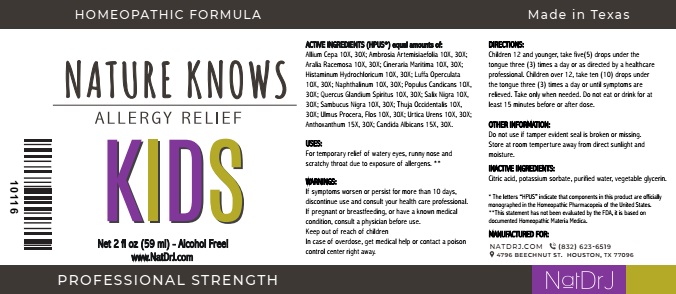
Nature Knows Allergy Relief For Kids while Breastfeeding
What is Nature Knows Allergy Relief For Kids used for?
Nature Knows Allergy Relief For Kids while breastfeeding safe or not? Can there be any side effects for infant while using it during breastfeeding?

Nature Knows Allergy Relief For Kids Breastfeeding Analsys
Onion while Breastfeeding
SafeCAS Number: 8054-39-5
At latest update no published data on excretion into breast milk were found. It is a widely used plant in preparing food and also in Phytotherapy as herbal extracts or essential oil. Given its lack of toxicity, a moderate consumption as herbal-based medicine during lactation would have low or no risk. Its consumption as a food is devoid of risk. The plant's bulbs are used which contain fructans, polysaccharides, flavonoids (quercetin glycosides), saponins, sterols and sulfoxides. Properties that were approved by the Commission E of the German Ministry of Health are: antibacterial, fat-lowering, antihypertensive, platelet aggregation inhibitor. It is used to treat loss of appetite and topically for bedsores and contractures. It has been used as a topical treatment for pain or inflammation of the nipple.There is insufficient evidence that would suggest ingestion of onions by the mother may be a cause of colicky pain or breast milk rejection by the infants.
Sambucus nigra flowering top while Breastfeeding
Low RiskCAS Number: 977002-47-3
Bush. Bark, leaves, roots, flowers and fruits are used for medicinal purposes in traditional medicine (diuretic, laxative, anti-infective for cold relief ...) without any scientific evidence on effectiveness.It contains flavonoids (quercetin, isoquercitin and rutin), phenolic acids, terpenes, minerals, tannins. Quercetin is excreted in breast milk in a concentration which increases with diets that contain products like elderberry. In the elderberry as well as other plants are contained endocrine disruptors that could display pro or counter-estrogen activity. Since it has no proven therapeutic benefit, it seems wise to avoid any consumption or doing it in very moderate way during lactation.
Nature Knows Allergy Relief For Kids Breastfeeding Analsys - 2
Urtica urens while Breastfeeding
Stinging nettle (Urtica dioica and Urtica urens) preparations have been used in nursing mothers orally as a postpartum as a "tonic" for treating anemia;[1][2] and is a purported galactogogue;[2][3][4][5][6][7] however, no scientifically valid clinical trials support the safety and efficacy in nursing mothers or infants for any use. Galactogogues should never replace evaluation and counseling on modifiable factors that affect milk production.[8] Although stinging nettle is generally well tolerated in adults, topical use can cause urticaria when applied topically, and application on one mother's nipple resulted in allergic skin rash in her breastfed infant. It is probably best not to apply stinging nettle topically to the breast while breastfeeding. Dietary supplements do not require extensive pre-marketing approval from the U.S. Food and Drug Administration. Manufacturers are responsible to ensure the safety, but do not need to the safety and effectiveness of dietary supplements before they are marketed. Dietary supplements may contain multiple ingredients, and differences are often found between labeled and actual ingredients or their amounts. A manufacturer may contract with an independent organization to verify the quality of a product or its ingredients, but that does certify the safety or effectiveness of a product. Because of the above issues, clinical testing results on one product may not be applicable to other products. More detailed information #about dietary supplements# is available elsewhere on the LactMed Web site.
Nature Knows Allergy Relief For Kids Breastfeeding Analsys - 3
Thuja occidentalis leafy twig and Breastfeeding
Low RiskThuja is one of the most common remedies used for warts. Topical Usage of Thuja for wart is likely safe while breastfeeding. We do not have sufficient safety usage data for Thuja oral consumption, However its likely unsafe to use thuja orally while breastfeeding.
Warning: Tropical usage in breast area shall be avoided to prevent the Thuja passing orally in Infants.Urtica urens and Breastfeeding
Low RiskWarning: Best not to apply Urtica Urens topically to the breast while breastfeeding
What should I do if I am breastfeeding mother and I am already exposed to Nature Knows Allergy Relief For Kids?
Due to high dilution of ingredients in homeopathic medicines they do not create much problem for baby. Nature Knows Allergy Relief For Kids is a homeopathic medicine and if your baby does not have any abnormal symptoms then there is nothing to worry about. Be careful with too much usage of ethanol based homeopathic medicines during breastfeeding.
I am nursing mother and my doctor has suggested me to use Nature Knows Allergy Relief For Kids, is it safe?
Homeopathic medicines are usually safe in breastfeeding and if Nature Knows Allergy Relief For Kids has been recommended by doctor then there should be no concern about its usage in breastfeeding.
If I am using Nature Knows Allergy Relief For Kids, will my baby need extra monitoring?
Not exactly.
Who can I talk to if I have questions about usage of Nature Knows Allergy Relief For Kids in breastfeeding?
US
National Womens Health and Breastfeeding Helpline: 800-994-9662 (TDD 888-220-5446) 9 a.m. and 6 p.m. ET, Monday through Friday
UK
National Breastfeeding Helpline: 0300-100-0212 9.30am to 9.30pm, daily
Association of Breastfeeding Mothers: 0300-330-5453
La Leche League: 0345-120-2918
The Breastfeeding Network supporter line in Bengali and Sylheti: 0300-456-2421
National Childbirth Trust (NCT): 0300-330-0700
Australia
National Breastfeeding Helpline: 1800-686-268 24 hours a day, 7 days a week
Canada
Telehealth Ontario for breastfeeding: 1-866-797-0000 24 hours a day, 7 days a week
